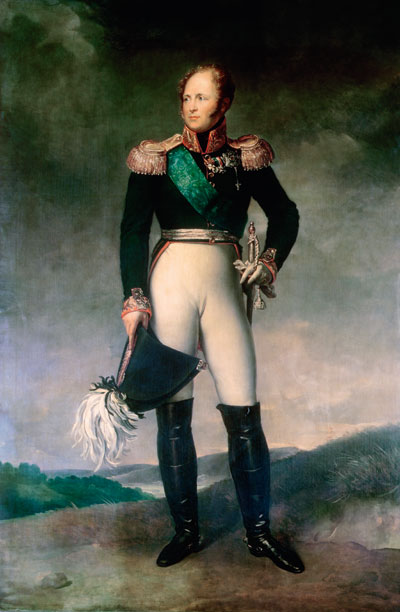A fanciful and doubtless risky parallel between Charles de Gaulle and the Russian emperor Alexander I suggested itself while I read Marie-Pierre Rey’s superb new biography of the latter.
Both men came to power through an act of political parricide: Alexander because he was tacitly complicit in the plot to overthrow his father, a plot which ended in Paul’s sordid murder in 1801, strangled with a scarf by the conspirator-courtiers after they discovered him cowering behind a screen in his bedroom; de Gaulle because he rebelled against his former mentor and the undisputed national hero from the Great War, Marshal Pétain, both on military strategy before the second world war and on the political choice to be made once it broke out.
Both men saved their nations from extinction by pulling off perhaps the greatest existential victory of their respective histories, against all the odds and using a similar strategy — even if it was forced upon them — of reculer pour mieux sauter. It took extraordinary political courage on Alexander’s part to fight an unpopular low-level war of attrition against the Grande Armée instead of seeking a glorious but futile confrontation, and then to withdraw in time after the murderous catastrophe of Borodino to ensure the army remained intact.
It took the same absolute commitment to victory in the face of apparent defeat then to burn the ancient capital, Moscow, to the ground to make the enemy’s conquest of it useless — an act of remorseless military logic which bears some glancing similarities to de Gaulle’s approval of the British attack on the French fleet at Mers-el-Kébir on 3 July 1940.
General Winter may have played a decisive role in the defeat of Napoleon’s half-a-million-strong invasion force but only because of Alexander’s tenacity and vision — he conceived of the strategy in 1811, before the dissolute but much-loved Field-Marshal Kutuzov did, whom Alexander appointed in the middle of the war, in August 1812, in spite of the fact that he personally hated him.
Finally, both Alexander and de Gaulle went on to engineer a spectacular reconciliation with their defeated enemy and to restructure the European system with great vision, putting their respective countries at the forefront of that system for decades and modernising them in the process. Alexander courted France in the teeth of opposition from the British, who were determined to cement a permanent coalition against her, because he distinguished the country from its transient regime and because he realised that her role was indispensable in the European concert.
He was one of the dominant figures at the Congress of Vienna and of course the prime mover behind the Holy Alliance. He also put forward far-sighted plans for disarmament and collective European security which were not to be seriously advanced again until a century later (under the impetus of his great-great nephew, Nicholas II, who called for the first Hague Peace Conference to be held in 1899). De Gaulle, of course, befriended Germany, and he was almost equally friendly to the Soviet Union when that was deeply unfashionable, for exactly the same reasons as Alexander had been to post-Napoleonic France.
This parallel between two men from different centuries and different countries is not one Marie-Pierre Rey suggests: she is too professional for that. Her story-telling is wonderfully lucid, and punctuated by careful judgments which are as measured as they are fair. She combines the very French capacity for drawing broad brushstrokes with great attention to detail. But it was one such detail— a tiny and apparently unimportant one — which triggered the comparison in my mind. In 1825, after 24 years on the throne, Alexander dreamed of abdicating and going to live in the Crimea. ‘And you,’ he wrote to his adjutant, Peter Volkonsky, ‘will resign and be my librarian.’ As it happens, in 1940, from London, de Gaulle wrote: ‘The most beautiful profession in the world is to be a librarian — in a public library in a small town in Brittany.’
It may not be a condition for the heroic exercise of power to wish one did not wield it, but it surely helps. As Rey shows, Alexander’s Christian faith became the dominant feature of his personality after 1812. In what is for me the most fascinating passage of the whole book, the author conclusively proves the truth of a rumour which started to circulate about Alexander in 1877, namely that he had converted to Catholicism and sent an envoy to Pope Leo XII in 1825 to engineer the end of the schism between Rome and the Orthodox Church (the Greek patriarch being still under the control of Ottoman Turkey at that stage).
The envoy, a French general in the tsar’s service, met the Pope who naturally was delighted with the plan and immediately appointed a representative to travel to Russia to conclude the deal. On leaving the audience, however, the general learned the news that the tsar had died. This is undoubtedly one of the most tragic missed opportunities in history.





Comments